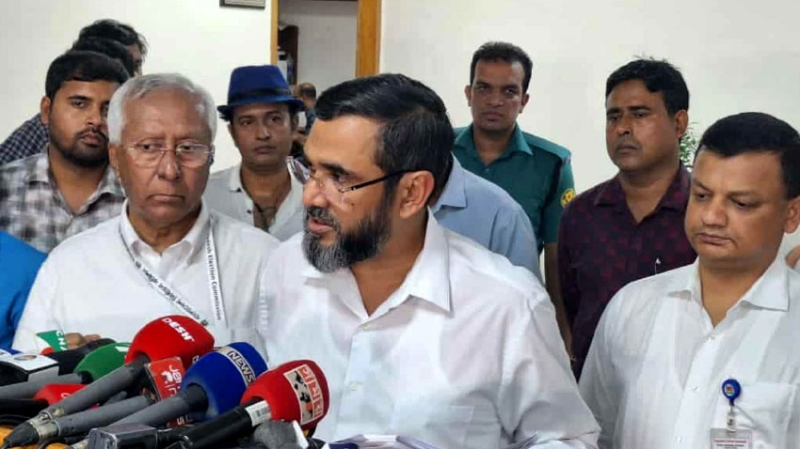- As debate over the location of climate conference razes on, will COP fail this time too? |
- UN Rights Office Warns of Gaza Escalation, West Bank Annexation |
- UN Warns Wildfires and Climate Change Worsen Air Quality |
- OIC Hails Belgian Declaration of Intent to Recognize Palestinian State |
- Bomb blast kills 15 near political rally in Pakistan |
EC Bars Fugitive Convicts, Drafts Sweeping Poll Reforms

Election Commissioner Brig Gen (Retd) Abul Fazl Md Sanaullah was briefing reporters on Wednesday
Fugitive convicts will no longer be able to contest elections in Bangladesh, the Election Commission announced on Wednesday, as it unveiled a series of sweeping reforms to strengthen electoral laws ahead of the 13th parliamentary polls.
Election Commissioner Brig Gen (Retd) Abul Fazl Md Sanaullah said that individuals declared fugitives by court cannot participate in the electoral process. He stressed that the measure was intended to ensure that only eligible and law-abiding candidates are allowed to seek public office, thereby upholding the integrity of elections.
The announcement coincides with the finalisation of draft amendments to the Representation of the People Order (RPO), which have been sent to the Law Ministry for vetting. Once reviewed, the reforms will be placed before the Advisory Council for approval and then enacted through a presidential ordinance.
The proposed law introduces significant changes. District election officers, rather than deputy commissioners, will be responsible for preparing polling station lists, a move aimed at enhancing neutrality in the process. Candidates will be allowed to spend a maximum of Tk 10 per voter, capped at Tk 2.5 million per constituency, while the security deposit for parliamentary aspirants will rise from Tk 20,000 to Tk 50,000. Nomination papers must be submitted physically, with no scope for online submission.
In addition, if an elected member of parliament is later found to have provided false information in their affidavit, their membership will be cancelled. In the case of a tie, fresh voting will be held instead of relying on a lottery system. Campaign restrictions will also be tightened, with posters banned and violations on social media or through artificial intelligence prohibited. The definition of law enforcement has been broadened to include the armed forces alongside police and other agencies.
One of the most striking features of the proposed law is the introduction of the ‘No Vote’ option in constituencies where only one candidate remains after withdrawal of candidacies. Voters will have the opportunity to reject the lone candidate by casting ‘No Vote’. If the ‘No Vote’ count exceeds the ballots in favour of the candidate, fresh polls will be scheduled. However, the option will not apply in the rescheduled election.
The reforms also enhance the authority of presiding officers. They will have the power to halt polling if irregularities occur beyond control—such as ballot box tampering, unlawful removal, or destruction—without having to first seek intervention from law enforcement agencies. “The presiding officer will be all-in-all over the polling of a station,” Commissioner Sanaullah remarked.
Officials said the amendments reflect months of deliberation aimed at modernising election laws and addressing past weaknesses. Once vetted by the Law Ministry and gazetted, the reforms are expected to guide the conduct of the upcoming national polls.

